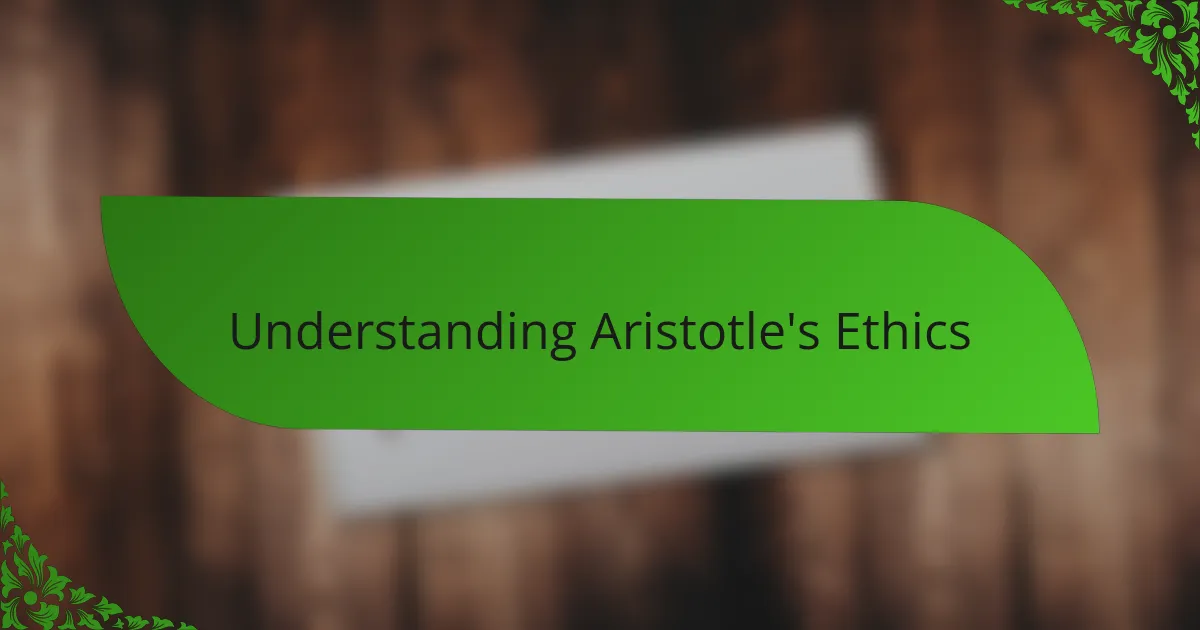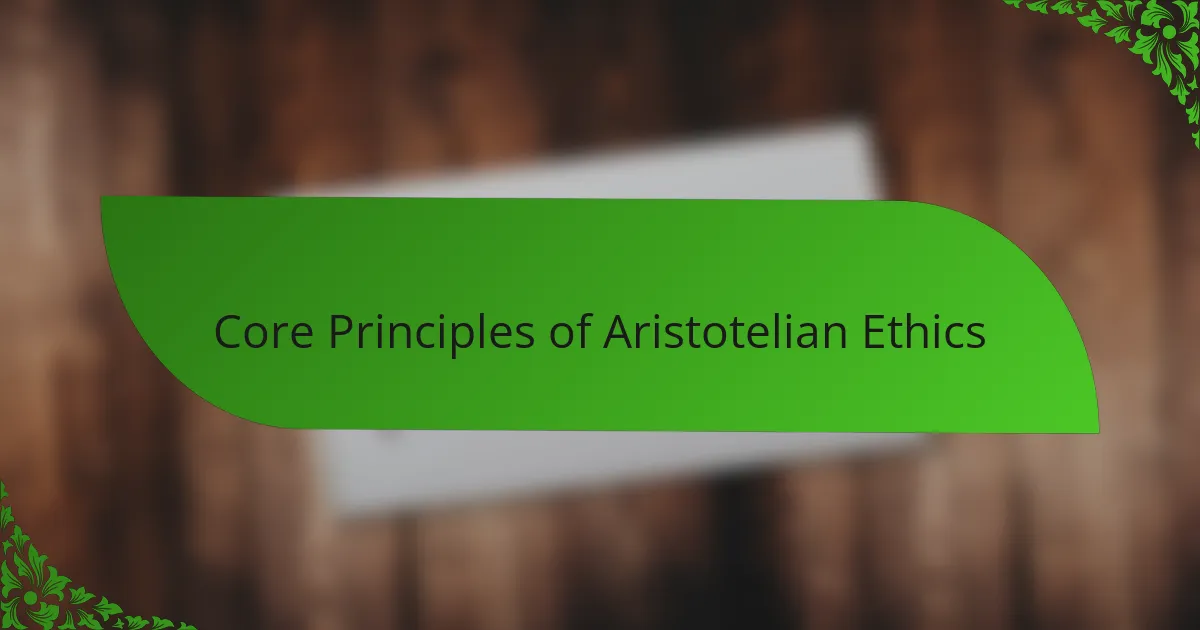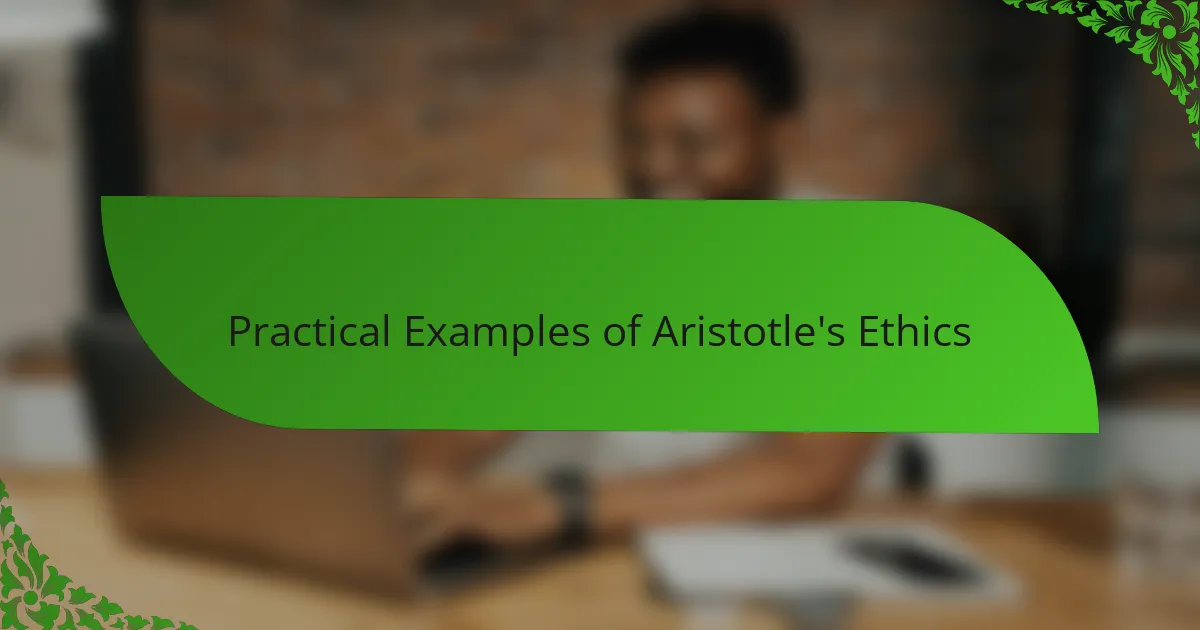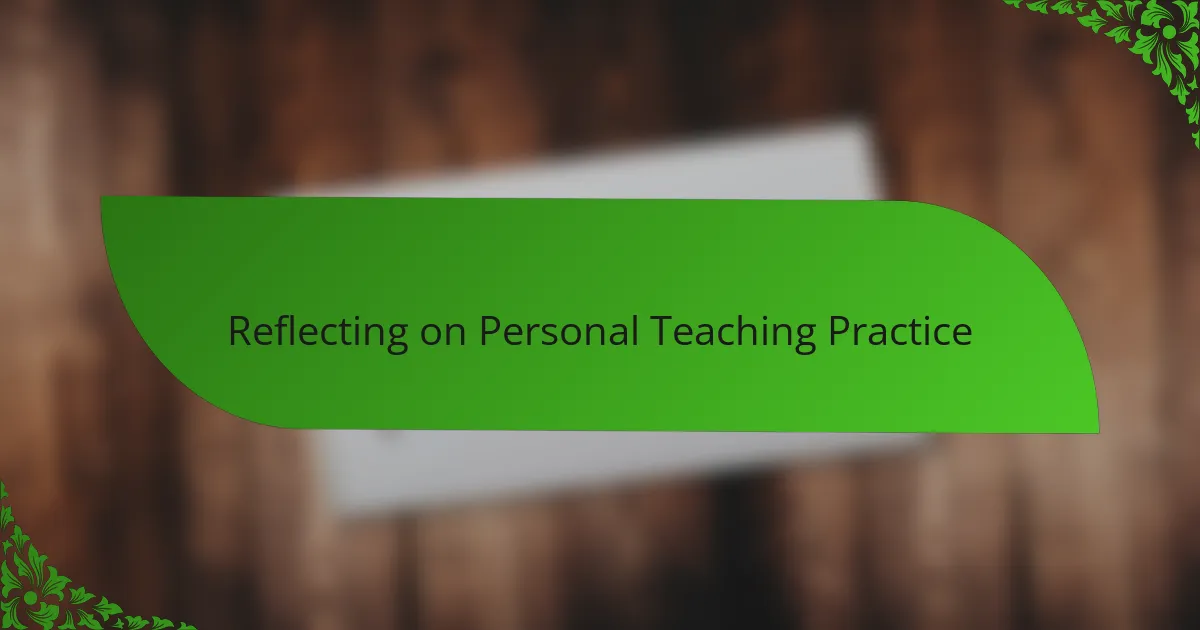Key takeaways
- Philosophy education fosters critical thinking and personal reflection, encouraging students to explore ethical dilemmas and connect abstract ideas to their lives.
- Aristotle’s ethics emphasizes cultivating virtues through habituation and finding the “golden mean” between extremes, shaping character and moral decisions.
- Applying ethics in the classroom involves modeling virtues, facilitating personal reflection on actions, and helping students recognize the impact of their choices on their growth.
- Teaching ethics creates a foundation of trust, enriching the learning environment and promoting collaborative and respectful interactions among students.

Philosophy Education Overview
Philosophy education often feels like diving into a vast ocean of questions without clear answers. I remember my first philosophy class — the moment I realized how much I didn’t know was both humbling and exhilarating. Have you ever wondered why some questions don’t have straightforward solutions but still push us to think deeper?
Teaching philosophy isn’t just about imparting knowledge; it’s about cultivating a mindset. I’ve found that encouraging students to wrestle with ethical dilemmas creates a space where critical thinking flourishes. It’s rewarding to see learners connect abstract ideas to their own lives, sparking moments of genuine insight and growth.
At its heart, philosophy education invites us to explore what it means to live well and think clearly. How often do we pause to examine our values or the reasons behind our actions? This reflective journey is what makes teaching philosophy both a challenge and a privilege for me.

Understanding Aristotle’s Ethics
Aristotle’s ethics centers on the idea of living a good life through developing virtuous habits. When I first encountered his notion of the “golden mean,” the balance between extremes, it reshaped how I thought about moral decisions. Have you ever noticed how too much or too little of anything often leads to trouble? That’s exactly what Aristotle warns against.
What resonates with me is how Aristotle links ethics to everyday actions, not just lofty ideals. It’s about practicing kindness, courage, or honesty repeatedly until they become part of who you are. This emphasis on character rather than rules has guided my approach in the classroom, reminding me that ethics is something we live, not just study.
I also appreciate Aristotle’s view that happiness, or eudaimonia, isn’t just pleasure but flourishing through virtue. It challenges the quick-fix mentality we often see today. It made me question, how do I help students see that ethical living is a lifelong journey of growth rather than a checklist? This question continues to shape how I teach ethics each day.

Core Principles of Aristotelian Ethics
Aristotle’s ethics revolves around the idea that virtue lies in finding the “golden mean” — a balanced middle ground between excess and deficiency. I find this principle incredibly practical because it acknowledges our human complexity rather than demanding perfection. Doesn’t it feel more realistic to aim for balance instead of extremes in our daily choices?
Another core aspect is the focus on habituation: virtues aren’t traits we’re born with but habits we build through consistent practice. I’ve seen this play out with students who initially struggled with patience or courage but grew by reflecting on their actions daily. Isn’t it empowering to realize that ethical growth is within our control?
Lastly, Aristotle ties ethics to eudaimonia — often translated as flourishing or living well. This idea always challenges me to move beyond surface-level happiness and consider what truly makes life meaningful. How often do we pause to think about what flourishing means for us personally and as educators guiding young minds?

Applying Ethics in Classroom Teaching
In my classroom, applying Aristotle’s ethics starts with modeling the virtues I hope to inspire in students. For instance, when I show patience during heated discussions, I’m not just managing the moment—I’m demonstrating a habit worth practicing. Have you noticed how witnessing genuine respect can often prompt others to mirror that behavior?
I also encourage students to identify the “golden mean” in their own choices, whether it’s balancing confidence with humility or ambition with contentment. It’s fascinating to watch them grapple with these nuances, realizing there isn’t a one-size-fits-all answer. Doesn’t that reflection make ethical learning feel deeply personal and alive?
Lastly, I make space for students to reflect on how their actions contribute to their own flourishing, just as Aristotle describes eudaimonia. Sometimes, after a challenging debate or project, we pause and ask: “How did this help us grow as thinkers and people?” These moments often reveal that ethics isn’t an abstract concept but a daily practice shaping their lives.

Practical Examples of Aristotle’s Ethics
One practical way I bring Aristotle’s ethics into teaching is by highlighting real-life scenarios where students must find balance. I recall a class discussion about honesty where a student wrestled with the choice between complete truth and kindness—this perfectly illustrated the golden mean in action. Have you ever faced a moment when choosing between two extremes felt less right than finding a thoughtful middle ground?
I also integrate habits of virtue through classroom routines, like starting each session with a brief reflection on courage or patience. Over time, I witness students shifting from impulsive reactions to more measured responses, which tells me that habituation truly works. Isn’t it incredible how repeated small actions can quietly shape who we become?
Sometimes, I invite students to connect ethics with their own goals by asking how virtues like perseverance contribute to flourishing beyond school. One student shared how embracing patience helped her navigate setbacks in her extracurricular activities, reminding me that Aristotle’s concept of eudaimonia resonates far beyond philosophy lessons. Doesn’t it encourage you to see ethics as a practical guide for living well, rather than just theory?

Benefits of Ethics in Teaching
Ethics in teaching creates a foundation of trust and respect that transforms the learning environment. From my experience, when students see their teacher consistently act with integrity, they feel safer to express ideas and take intellectual risks. Have you noticed how a classroom guided by ethical values naturally encourages collaboration and honesty?
Moreover, ethics helps teachers navigate complex situations with clarity and confidence. I recall a time when I had to address a sensitive issue involving fairness among students; grounding my actions in ethical principles prevented confusion and built understanding. Isn’t it reassuring to have a steady compass when tough decisions arise?
Finally, embracing ethics enriches both teacher and student growth beyond academics. Teaching Aristotle’s virtues isn’t just about rules; it’s about nurturing habits that shape character and life choices. Watching students develop patience or courage over time reminds me that ethical teaching is truly an investment in flourishing futures. Doesn’t that make the challenges worthwhile?

Reflecting on Personal Teaching Practice
Reflecting on my teaching practice often feels like holding a mirror to my own virtues and habits. I ask myself: Am I consistently modeling the patience and fairness that Aristotle champions, or do moments of frustration reveal areas I still need to work on? These honest self-assessments help me grow alongside my students.
Sometimes, after a particularly lively class debate, I pause to consider how well I facilitated balance between differing viewpoints. Did I encourage the “golden mean,” or did personal bias sneak in? Recognizing these nuances reminds me that ethical teaching requires ongoing mindfulness, not perfection.
I’ve noticed that reflecting doesn’t just improve my methods—it deepens my commitment to helping students flourish. When I see how my thoughtful adjustments create a more respectful and thoughtful classroom, it reinforces the belief that teaching ethics is a dynamic, lived practice for both educator and learner.